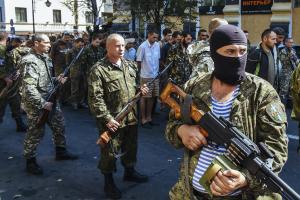The reported incursion came a day ahead of a summit that includes both Russian President Vladimir Putin and Ukrainian President Petro Poroshenko, and could be aimed at pressuring Ukraine into seeking a negotiated end to the conflict rather than a military victory.
Over the past month, Ukrainian forces have made substantial inroads against pro-Russia separatists in eastern Ukraine, taking control of several sizeable towns and cities that had been under rebel control since April, when the clashes began.
But the advances have come at a high cost — more than 2,000 civilians reportedly killed and at least 726 Ukrainian servicemen. There is no independent figure for the number of rebel dead, although Ukrainian authorities said Monday that 250 rebels were in fighting around Olenivka, a town 25 kilometers (15 miles) south of Donetsk.
Intense fighting and shelling persists for the two major rebel-held cities of Donetsk and Luhansk.
Col. Andriy Lysenko, a spokesman for Ukraine's National Security Council, told reporters that the column of 10 tanks, two armored vehicles and two trucks crossed the border near the village of Shcherbak and that shells were fired from Russia toward the nearby city of Novoazovsk. He said they were Russian military vehicles bearing the flags of the separatist Donetsk rebels. The village is in the Donetsk region, but not under the control of the rebels.
The Ukrainian National Guard later said two of the tanks had been destroyed.
In Moscow, Russian Foreign Minister Sergey Lavrov said Monday he had no information about the column.
The reported incursion and shelling could indicate an attempt to move on Mariupol, a major port on the Azov Sea, an arm of the Black Sea. Mariupol lies on the main road between Russia and Ukraine's Black Sea peninsula of Crimea, which Russia annexed in March. Capturing Mariupol could be the first step in building a slice of territory that links Russia with Crimea.
Although Mariupol is in Ukraine's separatist Donetsk region, most of the fighting between rebels and Ukrainian troops has been well to the north. A full offensive in the south could draw Ukrainian forces away from the city of Donetsk.
View gallery

Pro-Russian gunmen guard parade dozens of captured Ukrainian soldiers during a march in mockery of t …
Lysenko said Mariupol for now has enough defenders "to repel any attack of uninvited guests."
Still, a wider war in the east would put new strains on Ukraine's military, which initially struggled with longtime underfunding and disorganization against the rebel threat.
Ukraine of late has appeared bent on beating the rebels militarily, but pressure is growing for a negotiated settlement. German Chancellor Angela Merkel met with Poroshenko on Saturday and called for a political solution.
Poroshenko and Putin are among a group of leaders gathering Tuesday in Minsk, Belarus, for a summit, but it unclear whether they will meet one-on-one to discuss the crisis.
Lavrov, the Russian foreign minister, said Monday that he hoped European Union officials, who will also be at the summit, "will come prepared to use their influence on the Ukrainian side."
Ukraine and the West say that Russia is supporting and supplying the rebels. NATO says since mid-August, Russia has fired into Ukraine from across the border and from within Ukrainian territory. Moscow denies those allegations.
Fighting continued elsewhere in the east, notably around Olenivka. Lysenko said Monday about 250 separatists had been killed in that fighting, but did not specify in what time period. On Sunday, rebel leader Alexander Zakharchenko said two-thirds of Olenivka had been wrested away from Ukrainian control.
Ukrainian forces had made significant inroads against the separatists in recent weeks, but the rebels have vowed to retake lost territory.
Russia announced plans, meanwhile, to send a second aid convoy into rebel-held eastern Ukraine, where months of fighting have left many residential buildings in ruins.Russia's unilateral dispatch of over 200 trucks into Ukraine on Friday was denounced by the Ukrainian government as an invasion and condemned by the United States, the European Union and NATO. Even though the tractor-trailers returned to Russia without incident Saturday, the announcement of another convoy was likely to raise new suspicions.
Lavrov said the food, water and other goods the convoy delivered Friday to the hard-hit rebel city of Luhansk were being distributed Monday and that Red Cross workers were involved in talks on how best to do that. There was no immediate confirmation from the Red Cross.
In sending in the first convoy, Russia said it had lost patience with what it called Ukraine's stalling tactics. It claimed that soon "there will no longer be anyone left to help" in Luhansk, where weeks of heavy shelling have cut off power, water and phone service and made food scarce.
The Ukrainian government had said the aid convoy was a ploy by Russia to get supplies to the rebels and slow down the government's military advances.
On Sunday, as Ukraine celebrated the anniversary of its 1991 independence from Moscow, Poroshenko announced that the government would be increasing its military spending in a bid to defeat the rebels.
In rebel-held Donetsk, captured Ukrainian soldiers were paraded that same day through the streets, jeered by the crowd and pelted with eggs and tomatoes.
___
Peter Leonard in Donetsk, Ukraine, and Lynn Berry in Moscow contributed to this report